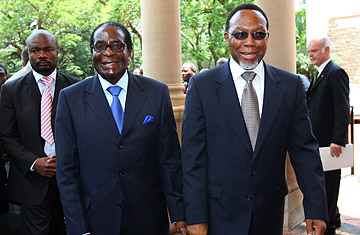
Southern African leaders failed to end Zimbabwe's political crisis amid threats by President Mugabe to form a government excluding his rival.
In what it said was an attempt to force the regime to release its members from jail, Zimbabwe's opposition Movement for Democratic Change (MDC) on Friday announced that it will join Robert Mugabe's ruling Zanu-PF party in a unity government. "Aware of the suffering people of Zimbabwe, the MDC national council has resolved that we go into the government," party leader Morgan Tsvangirai told reporters. Tsvangirai stressed, however, that despite agreement on a unity government, his party's struggle with Mugabe was far from over. "Political detainees must be released and some of the appointments made by President Mugabe must be reversed," he said. "Make no mistake, we are not saying that this is a solution to the Zimbabwe crisis. Our participation signifies that we have chosen to continue the struggle for a democratic Zimbabwe in a new arena... regardless of how long that struggle takes us."
Under the power-sharing arrangement, Mugabe, who turns 85 next month and who has ruled Zimbabwe for 28 of those years, will remain President. Tsvangirai, who won more votes than Mugabe in a presidential election last March, will take the new post of Prime Minister by Feb. 11, presiding over a government comprising an equal number of ministers from the MDC and Zanu-PF. For six months, control of the Home Affairs Ministry — which controls the police force that has, until now, been deployed on behalf of the ruling party against the opposition — will be shared between the two parties, after which all ministerial appointments will be reviewed. (See images of political tension in Zimbabwe)
A crowd of several hundred supporters cheered Tsvangirai as he addressed them outside the MDC meeting in Harare, and passing motorists blew their horns as the news was broadcast across the Zimbabwean capital. Forbes Sithole, a 40-year-old office clerk, who was in the crowd listening to Tsvangirai, said: "This is what we have been waiting for. This man is the only answer to our woes." Thabani Moyo, a spokesman for the Media Institute of Southern Africa, which champions press freedom in Zimbabwe, was more cautious: "I support the MDC decision because it has been done with the people in mind. Zimbabweans have suffered. But it is too early to celebrate. It remains to be seen if Zanu-PF will respect their counterparts. That's crucial."
Its equal standing in the cabinet and its majority in parliament and most local authorities puts the MDC is in a strong position — on paper, at least. But until now, such formalities have meant little in the face of the muscle wielded by the ruling party. Mugabe's security forces massacred thousands of supporters of a rival liberation party in the mid-1980s. After the MDC won the general election in March, the security forces unleashed another wave of violence against the opposition, in which nearly 200 people were killed. That repression forced Tsvangirai's withdrawal and allowed Mugabe to "win" a second round presidential run-off unopposed. For reasons he never explained, at his inauguration Mugabe unexpectedly reversed course, announcing he was prepared to share power with the MDC. Although South African mediation efforts managed to secure agreement over forming a unity government, the process quickly stalled when it came to allocating cabinet positions, with the ruling party reluctant to cede significant control. Friday's announcement by the MDC may have opened the way to ending the stalemate — if Mugabe respects the deal.
Whether or not the arrangement secured by the MDC results in a genuine sharing of power, the opposition knows that a national unity government is key to rescuing Zimbabwe from a slow-moving catastrophe. As the politicians have battled over power, Zimbabweans have been suffering under the burden of poverty, hunger and disease, amid 80% unemployment. After years of hyper-inflation, Zimbabwe on Thursday finally abandoned its own currency in favour of the U.S. dollar and other neighboring currencies. Millions of Zimbabweans have fled the country in search of a better life elsewhere. The World Food Program warns that around 7 million Zimbabweans — more than half the pre-crisis population — is in need of food aid. Even more urgent is a cholera epidemic, spawned by the collapse of the water, sewage and public health systems in the capital, which the U.N. says has infected 60,000 people, and has killed more than 3,000.
Genuine political power-sharing has become the vital first step to reversing the country's catastrophic decline, because international donors and investors are unwilling to help a Mugabe regime clinging to power against the will of its electorate. Zimbabweans are hoping the pact will bring the relief workers, aid and investment from abroad needed to revive a nation that, until a decade ago, had been deemed a developing world success story by measure of its economy and health and education services. "Tsvangirai is going to attract rich nations like the United States of America and Britain to help rebuild our country," said Sithole. That is the hope. Once again, Zimbabweans must await the reality.
—With reporting by correspondents inside Zimbabwe
